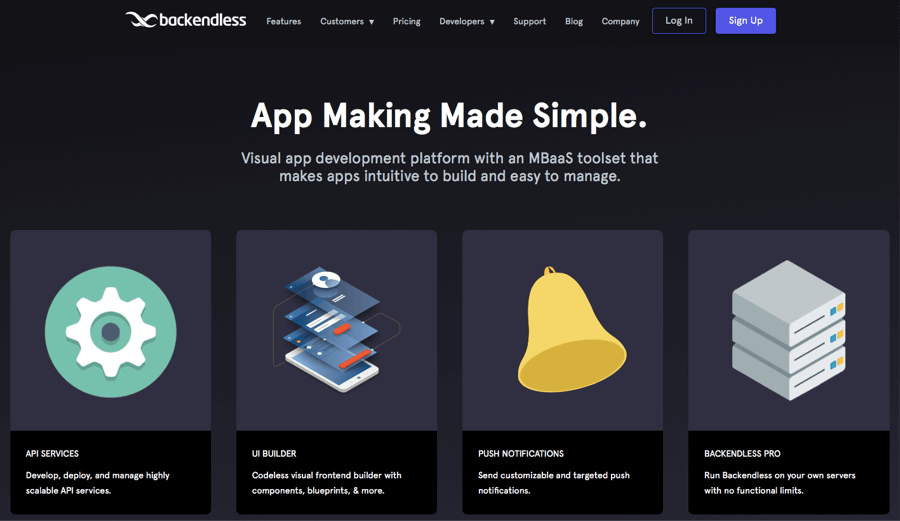Top 5 Android Application Providers
You have a great idea for an Android mobile app. Or your business is progressing, and you are in the state of adding a mobile app. Now the question becomes what type of hosting platform you should use? There are many types of hosting platforms that all have their pros and cons. Okay, so where do you start?
The first step is to decide if Cloud Hosting is the right move for you. This will be based on you and your company’s needs, though it will be a yes in most cases. To decide on this, you will first need to know what application hosting is and the advantages of cloud hosting. After that, you will need to know which hosting application works best for your company’s needs.
This is detailed out in the final section of top android application platforms.
Contents
Application Hosting
So, what is application hosting, and why is it important? Application hosting allows you to create the backend for a mobile app or a website without coding the whole app/website. This is helpful as it saves you time and the headache it would take to code each area of the website from scratch.
One commonly brought up example of an application hosting platform is WordPress. The standard version of WordPress allows the user to set up the backend manually piece by piece. This is great if you have a thorough understanding of coding and backends. A lot of users do not.
WordPress now offers a pre-installed version which bypasses the need for manual setup. This version boasts a one-click setup so. Once it is installed, information and images can be plugged in to create blog posts.
Cloud Hosting Advantages
Now that you understand the basics of application hosting let’s explore cloud hosting and some advantages. Standard hosting applications require space to be paid for upfront. This is where the information and applications are stored. Cloud hosting allows the space to be flexible and increase or decrease as needed. Great, so what are the advantages?
- Balanced load among servers
Since the applications and information are in the “cloud,” it is spread out evenly between servers. If one server goes down, the information and applications will not be lost.
- Adjustable required space
As noted above, the space needed for the customer’s backend is flexible with cloud hosting. This prevents the customer from prepaying for too much or too little space.
- Infrastructure-as-a-service (IaaS)
Cloud Hosting platforms run and maintain the applications on the backend. These applications are paid for upfront, like a subscription in exchange for the company providing this service.
Top 5 Android Application Providers
There are many Android application providers available. If you search online, at least ten will immediately pop up. So which ones should be considered and what’s the difference between each? The following list will provide the top five Android Application hosting platforms and the differences between each application.
1. Back4app

This serverless hosting platform comes with many perks. Some of which include queries based on location, ample storage space for files, interface data grids, multiple platform SDKs, and much more.
Back4app seems to be one of the few apps that offer push notifications so users can always stay up to date on the latest news from the app. Because of the many benefits the Back4app offers, it’s no wonder this platform ranks at the top.
More features include:
- Relational Database Schema & Queries
- GraphQL & REST APIs
- Opensource & no vendor lock-in
2. Heroku

Heroku is another cloud-based application. Heroku does offer SQL but seems to lack REST APIs while Back4app includes GraphQL and REST APIs. Both applications do offer scalability which is a plus as your company grows in success.
Heroku does offer the ability to bundle packs of applications together or choose from pre-bundled packs. Also, instead of email and push notifications, Heroku offers data insights via a secure URL.
Other features include:
- Heroku runtime
- Code and date rollback
- Smart containers
3. Firebase

Firebase is another great contender. This platform also offers serverless apps, as most cloud-based applications do. Firebase offers the ability to build apps while a 3rd party maintains the infrastructure. Of course, Firebase also offers scalability and cloud storage like the previous platforms.
A few different perks Firebase offers are tools for testing and reports for when the app or website crashes. These features are offered most likely since Google backs it.
Additional features:
- SSL Certificates for free domains
- SSD hosting
- Firebase ML – APIs
4. Kinvey

Kinvey is another cloud-based platform that offers serverless applications. Kinvey also offers data storage and easy login in the form of a Single sign-on.
Kinvey centers around user experience to differentiate itself from its competitors. Kinvey also offers backend environments with individual settings.
Other features:
- Multiple platform SDKs
- Backend app containing APIs
- Data integration
5. Backendless

Backendless is another app that features customizable push notifications and email notifications. Something that differentiates Backendless is that it requires no coding whatsoever.
This is a great platform for people who are newer to mobile app hosting. Backendless can be used as both the frontend and backend as it offers both SDKs and REST APIs.
More features:
- API management
- Data integration from previous systems
- Codeless visual front-end builder
Conclusion
As noted above, most available platforms offer cloud-based services and storage to allow for more flexibility. By this point, you should have an understanding of application hosting and cloud-based hosting.
After reading the above descriptions of the top five Android Hosting Applications, you should be familiar with the differences and similarities between each application. No matter which application you go forward with, you will be kept in the loop with updates either by push notifications or email notifications.
All platforms also include APIs of some sort and offer the user the ability to scale their business easily with the applications. Here’s to picking the right platform for your company and scaling your business with an Android hosting application!
FAQ
What is application hosting?
Application hosting allows you to create the backend for a mobile app or a website without coding the whole app/website.
What are the advantages of application hosting?
– Balanced load among servers
– Adjustable required space
– Infrastructure-as-a-service (IaaS)
What are the best application hosting providers for Android?
– Back4app
– Heroku
– Firebase
– Kinvey
– Backendless



